
Has Tech Changed War Reporting?
They’re out there in the danger zone, not quite in the line of fire, but a heck of a lot closer to the bullets than most of us. How does it feel to earn a living in the killing fields? We asked Nic Robertson, Sr. International War Correspondent, CNN, for some answers.
What protective gear do you wear? What about training?
We’re always given a flak jacket and helmet. In Afghanistan, we also travel with a first aid kit, medical kit, trauma kit, and battle field dressing. A good amount of water. GPS equipment. We accumulate it over the years. In a riot situation in Kenya, I took my flak jacket but not my helmet because you don’t want to give away that you’re wearing protective clothing. CNN gives us a week-long training on battle field assessment, first aid, situational awareness. Those help a lot, but by the time I took it, it was almost second nature.
If the situation calls for you to pull an injured soldier to safety, are there rules for/against this?
There is no policy. Human instinct and nature take over. Our job is to record what’s happening but if someone is in harm’s way, then you do it.
What if you don’t want to go into a certain area? Can you opt out?
People will tell you that you can’t go here because it’s dangerous, but then you find only a few cities or a few streets are dangerous. There have definitely been times when I’ve said we’re not going down this street because it’s ridiculous.
How has technology changed coverage of wars?
Now you get to the frontline and stay there for longer. In 1993 we went to Moscow, which was under siege for three months. We went over the mountains on donkeys, and it took us a couple of days. The equipment was heavy and bulky, we couldn’t take much gear. We had to leave right afterward to get the news out. Now we can do the same thing and broadcast live and carry all our equipment in a backpack and stay as long as we want. Technology has made the reporting a lot more personal.
Is there any particular incident that is etched in your memory?
It is the moments at war when you are afraid. In Baghdad in 1991 or 2003. In Romania driving through dangerous checkpoints. In 1991, waiting for cruise missiles not knowing if we would be a target.
Other moments have been imprinted. Like when I was on a mountaintop in Bosnia, the ethnic separation.
There was an afternoon where Serbs were told to go to one side and Croats to the other. A family was split in half. It felt horrible. It was the same thing watching people coming out of Kosovo. They had nowhere to go, but what can you do? And, some time before 2001, watching a guy in Afghanistan with his family, picking through rubble of his burnt house with a spade; it was all they had, their life was so desolate.
Are there times when you have been unable to report what’s happening on the ground for the safety of those involved? How do you take this call?
You have to use your judgment. If you’re in a military embed, you’re forbidden from reporting immediate operational details. Whether you’re with someone perceived to be the enemy or with the good guy, you have to be very aware that people’s lives are in danger.
Why do people decide to become war correspondents? Do they crave the action and adventure?
I think it’s something deep inside you. The journalistic desire to tell the story. I felt strongly enough to want to go to these places and do it. It happened by default because I was ready and willing to go where other people weren’t.
Do you ever feel a war was underreported or misreported? If so, why does this happen?
I don’t think the reporting side gets lost. But it’s very hard to report war so that people at home can experience and feel it. It’s a very intense thing, and hard to convey the intensity and feel of it to people who haven’t been there. When you’ve seen a lot of wars, like soldiers, you start to ask, what is all this killing about?
There is a frustration. Five minutes ago I framed a map of Bosnia, because here was a country at war and now it’s at peace. It’s a bigger frustration that war is futile. If only you could convey what the soldiers really go through and what they feel.
Last issue, we promised you our insider would be an astronaut. We apologise for not being able to deliver this time. We will definitely have that space traveller on this page next issue. So, if you have questions,email us (ask.forbesindia@network18online.com) or write to Ask the Insider at our office address. We also welcome suggestions on future “insiders” you’d like to see.
(This story appears in the 30 November, -0001 issue of Forbes India. To visit our Archives, click here.)





